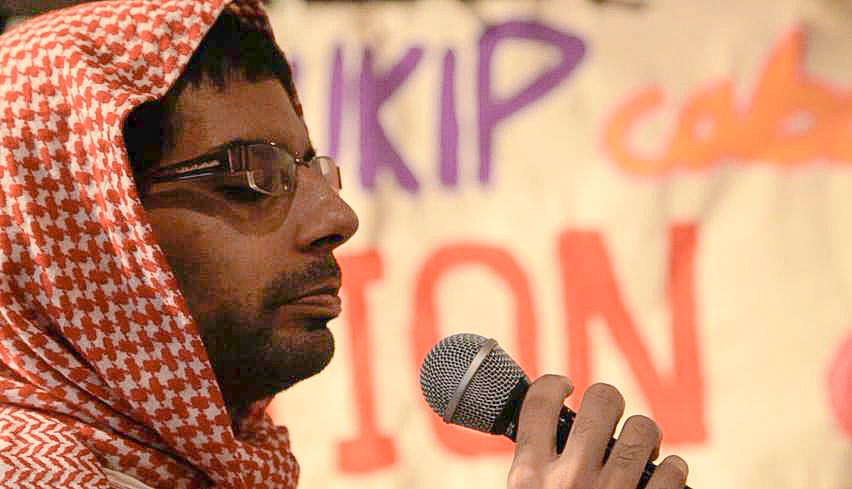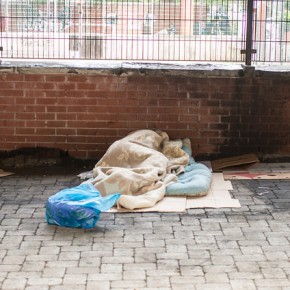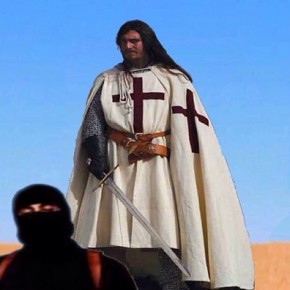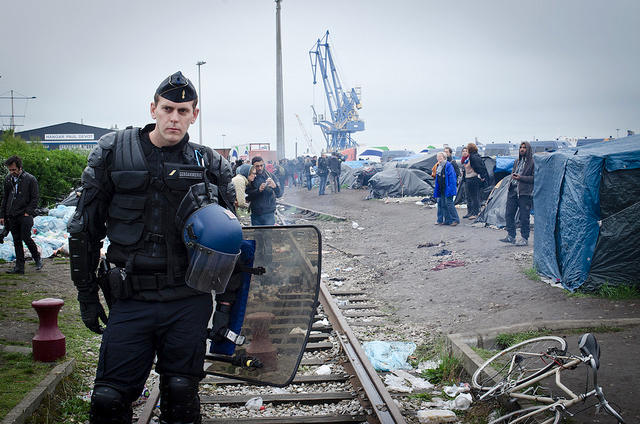On Sunday afternoon, I participated in an act of theatrical protest at Nigel Farage’s local pub: the George & Dragon in Downe. During the “Beyond UKIP Cabaret,” I recited the azan over a loudspeaker, while wearing a red-and-white keffiyeh.
The event was profiled by Stuart Jeffries in The Guardian, who recounted activities that included me, migrants, LGBT people, disabled people, Palestinian dabke dancers, a Holocaust survivor, and breastfeeding mums. The Cabaret was covered by the BBC, The Independent, Huffington Post, and Vice. It also led to a tense interview on BBC Daily Politics (36:25). Photographer Mike Kear was working at the event, and has posted a great album that is worth flipping through.
Many outlets focused on Farage’s claims that he “lost his children” and that they were “terrorised” as a result of us parading to The Queen’s Head across the street, where he was spotted by several organizers. We strongly dispute this. At no point did we approach him in the company of any children, and he left in his car, with a female driver. Eyewitnesses claim to have seen a woman leave The Queen’s Head with two children before our actions at Farage’s car. Saying they were “lost” is deliberately misleading.
We expected as much. The reason that UKIP has managed to gain major national attention in the first place is because it has an excellent public relations team. I have few regrets about the action, despite bizarre threats from Britain First to give us a “taste of our own medicine.” I presume this would involve a conga line. We may have lost the “battle of the story” in media outlets, and there are lessons to be learned from that, but Farage deserved to be humiliated. We showed him exactly what we think of his politics, and I am proud.

On Sunday, at 5:25 PM, fellow protester-performer Ewa Jasiewicz posted a photo of me delivering the azan at the event. I saw it, and laughed as I recalled an interaction I had with our legal observer, who told me over a cigarette, “You know, it was really surreal, I was sitting in Nigel Farage’s pub next to a bloke in a banana suit, listening to the Islamic call to prayer. Which I’m sure violates some rule.”
I laughed and responded, “Oh well, yeah,” as one of the Palestinian dabke dancers sarcastically pointed at me and went, “Haram! Haram!” These were lighthearted jests, playing on the Arab word for sinful. Multiple people approached me after the event to tell me that they were deeply moved by the recitation. “Yes, it was haram,” said one person, “but it was so haunting and emotional.” Does the fact that it violated some rule even matter, in that case?
Part of the reason that I study jihadist groups is because I believe that in a twisted way, they are ahead of many Muslim organizations when it comes to recognizing the importance of subjectively interpreting Islam. Arguments that jihadist activities violate scriptural tenets and inherited rituals miss the point. Jihadists believe in an Islam that is divorced from its literal and explicit content. Instead, Islam is used to mobilize personal views on morality.
The problem is that jihadists conclude this process with intense violence, without any interest in promoting democracy or pluralism. What matters is the first part of their gesture, of appropriating their religion, and the freedom it entails. Not the latter part, which neoconservatives haven’t been entirely wrong to condemn as “Islamofascist.” Islam is just an excuse for reactionary politics, not emancipation. Their rule breaking serves no progressive purpose.

During the Beyond UKIP Cabaret, I broke the rules to deliver the azan in the heart of UKIP country, and left my religious expression as a marker on the George & Dragon. As I sang the call to prayer in the pub, I felt words that distressed Muslims have been crying out since the initial migration to Medina. They floated in the air, and wrapped themselves in the bricks and mortar of the building around me. For a few moments, the pub became a masjid, sanctified as a place of safety for the ummah and those who stand with us.
Farage goes to the George & Dragon for personal leisure, and also politicizes that fact in order to seem like a “regular bloke who has a pint on Sundays.” We did much the same thing by staging our cabaret in a “haram establishment” seemingly hostile to such activities. I have spent the last week smiling at the fact that I played a small role in politicizing Farage’s pub in direct opposition to the xenophobia that people like him have made a career in circulating.
There can be no doubt that UKIP has nurtured an aggressively racist, sexist, homophobic, and classist atmosphere that in addition to having violent consequences for other groups, has also empowered groups like Britain First to directly harass and attack Muslims throughout the United Kingdom. Muslim cultural expression is increasingly dangerous in Western Europe, and Muslims can either respond by abandoning these rituals, or militantly asserting them within a wider platform that affirms democratic pluralism and unravels various forms of inequality.
No one at the event itself found my gesture to be particularly controversial. I was deeply moved to see that the deep ambivalence that many European leftists feel towards Muslim religious expression was not present among the event’s attendees. These were people who respected how Muslims like me can rely on Islam as an important moral centre for their political activities, and heavily criticize people who argue otherwise.
It is clear to me that this wasn’t just a “celebration of diversity,” despite our branding of it as such. It was specifically a celebration of exactly the diversity that people like Farage hate, and seek to expel from countries like the United Kingdom. We responded by unleashing every aspect of that diversity in one of their strongholds, including the azan, breastfeeding mothers, raucous dancing to gay anthems, and a gay donkey that we named “Charlie.” We shoved so much diversity down Farage’s throat that when he fled the scene, he couldn’t even look us in the eye.
The Beyond UKIP Cabaret wasn’t just an affirmation of the kind of Britain that we all desire, and in many ways, already exists. It was also an acknowledgement that we must continue to place diversity at the centre of struggles against sociopolitical disenfranchisement, and economic inequality. Judging from the fact that neoliberal processes continue to intensify in the fallout of the 2007 economic crisis, the fight to mobilize diversity in this manner has only just begun. I intend to recite the azan constantly.
Photographs courtesy of the author and Mike Kear.





